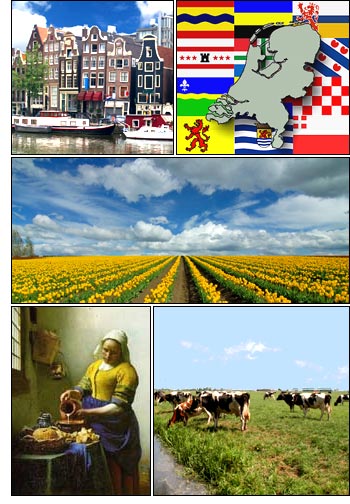 History of Holland
History of HollandHistory of Netherlands
Amsterdam Holland
Netherlands cities
Tulips of Holland
Dutch painters
Dutch writers and scientists
Dutch paintings
Famous Dutch people
Dutch history
Dutch folk tales
Rembrandt and the Nightwatch
Holland history
Holland on sea history
Pictures of Holland
Dutch architecture
Holland facts
New Amsterdam history (New York)
Useful information
History of Holland
 The name, "History of Holland," is given to this website because the Netherlands are also known as "Holland", named after the maritime province of Holland that took a predominant part in the War of Independence and throughout the whole of the subsequent history of the Dutch state and people. However officially the name of the country is the Netherlands.
The name, "History of Holland," is given to this website because the Netherlands are also known as "Holland", named after the maritime province of Holland that took a predominant part in the War of Independence and throughout the whole of the subsequent history of the Dutch state and people. However officially the name of the country is the Netherlands.In every language the country, comprising the provinces of Groningen, Friesland, Drenthe, Overijssel, Gelderland, Utrecht, Noord-Holland, Zuid-Holland, Limburg, Noord-Brabant, Zeeland and the newest province Flevoland, has, from the close of the 16th century to our own day, been currently spoken of as Holland, and the people as "Hollanders." It is only rarely that the terms the Republic of the United Provinces, or of the United Netherlands, and in later times the Kingdom of the Netherlands, are found outside official documents.
The character, however, of the people of the province of Holland, its qualities of toughness, of endurance, of seamanship and maritime enterprise, spring from the peculiar amphibious nature of the country, which differs from that of any other country in the world. The age-long struggle against the ocean and the river floods, which has converted the marshes, that lay around the mouths of the Rhine (Rijn), the Meuse (Maas) and the Scheldt (Schelde), by toilsome labour and skill into fertile and productive soil, has left its impress on the whole history of this people.
Nor must it be forgotten how largely this building up of the elaborate system of dykes, dams and canals by which this water-logged land was transformed into the Holland of the closing decades of the 16th century, enabled her people to offer such obstinate and successful resistance to the mighty power of the Spanish Philip II.

